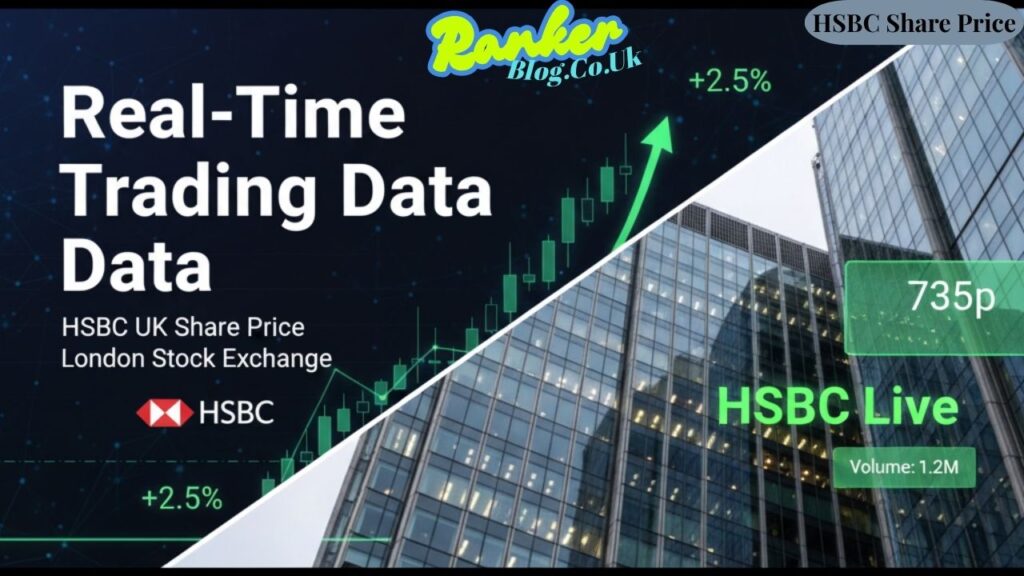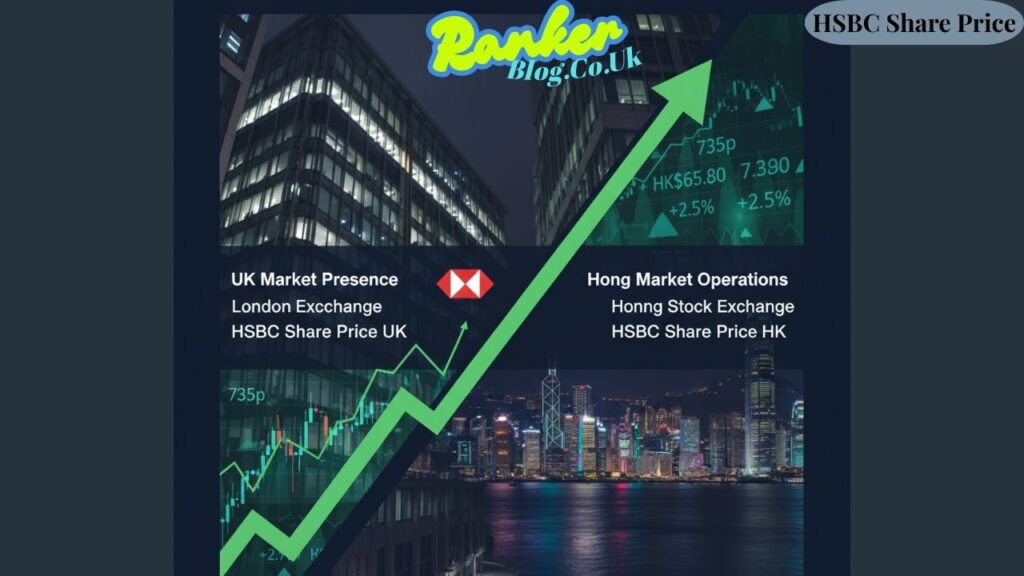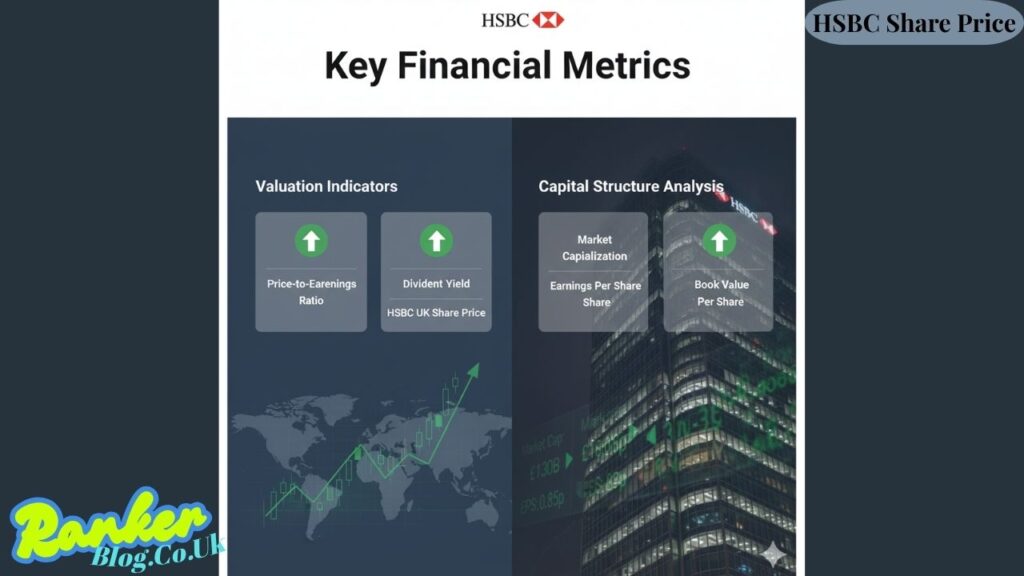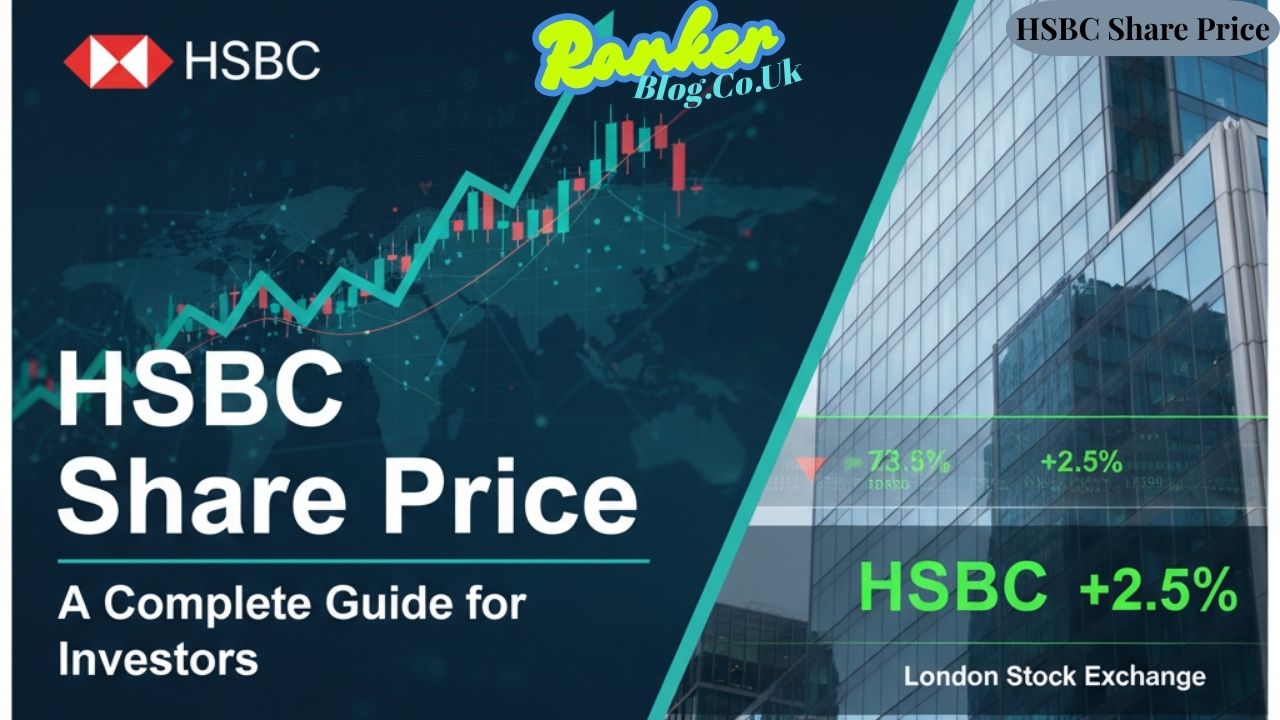Introduction
HSBC Holdings PLC is one of the world’s most prominent financial institutions, serving millions of customers worldwide. For investors seeking exposure to the banking sector, understanding the movements of HSBC’s share price is crucial for making informed investment decisions. Whether you’re monitoring the HSBC share price UK or tracking the London HSBC share price, keeping a close eye on stock performance helps you identify potential opportunities and manage your portfolio effectively. Several factors influence share price fluctuations, including macroeconomic conditions, interest rate changes, and regulatory developments in the banking industry.
Current Share Price & Recent Performance

Real-Time Trading Data
The HSBC share price today reflects the combined sentiment of thousands of investors trading across multiple exchanges. For those based in the UK, the HSBC UK share price offers immediate insights into the market’s perception of the bank’s value. The share price of HSBC UK is available on major financial platforms, with updates flowing throughout trading sessions.
Traders and investors actively monitor the HSBC share price to identify entry and exit points. The HSBC share price fluctuates in response to market conditions, economic news, and company-specific developments. London investors have direct access to the SBC London share price information through the London Stock Exchange, where the company maintains significant liquidity.
Performance Metrics
The year-to-date performance of the HSBC share price provides valuable context for understanding recent market sentiment. The 52-week range establishes the trading corridor within which the stock has moved, offering perspective on current valuation levels compared to recent extremes. Recent price movements and trends help investors determine whether the stock is experiencing momentum or consolidation.
HSBC Share Price Across Global Markets

UK Market Presence
The HSBC share price on the London Stock Exchange represents one of the primary trading venues for this global institution. Investors searching for the HSBC share price can gain access to comprehensive trading data through the London Stock Exchange. The London HSBC share price maintains a close correlation with international market sentiment, though local factors can create temporary deviations.
Hong Kong Market Operations
The HSBC HK share price reflects significant investor interest in Asia, where the bank maintains substantial operations. The HSBC share price HK represents a crucial alternative listing for international investors seeking Hong Kong exchange exposure. Additionally, the HSBC bank Hong Kong share price provides specific insights into how the Hong Kong market values the institution’s presence and performance in the region.
Key Financial Metrics

Valuation Indicators
The Price-to-Earnings ratio of the HSBC share price helps investors compare valuation against historical averages and competitor benchmarks. Understanding the HSBC Holdings plc’s share price in the UK in relation to its earnings helps determine whether the stock trades at a premium or a discount. The dividend yield provides income-oriented investors with insight into the cash returns generated by holding the shares.
Capital Structure Analysis
Market capitalization represents the total value assigned by the market to a company’s entire stock of shares. Earnings per share demonstrate the bank’s ability to generate profits attributable to each share of its stock. The book value per share indicates the net asset value supporting each share of stock, providing a floor value estimate during distressed periods.
Factors Influencing HSBC Share Price
Macroeconomic Environment
Interest rate decisions by central banks directly impact banking profitability and investor demand for financial stocks. Global economic conditions determine customer demand for banking services and the quality of loan portfolios. Currency exchange rates have a significant impact on HSBC’s reported earnings, given the corporation’s substantial international revenue streams and operations across multiple continents.
Regulatory and Competitive Landscape
Regulatory changes in the banking sector can dramatically alter capital requirements and profitability metrics. Competition in the banking industry intensifies pressure on margins, pushing institutions toward technological innovation and efficiency improvements. Geopolitical events affecting Asia and Europe create uncertainty that ripples through HSBC’s diverse market footprint.
Historical Share Price Analysis
Long-Term Trends
Examining long-term price trends reveals how the HSBC share price has responded to various market cycles and economic conditions. Major price movements and catalyst events typically mark turning points, where investor sentiment shifts dramatically. Comparison to industry peers provides context for evaluating whether HSBC outperforms or underperforms relative to competitors. Performance during economic cycles demonstrates the stock’s resilience during recessions and its participation in recoveries.
Analyst Ratings & Forecasts
Professional analysts provide current recommendations, ranging from “strong buy” to “sell” ratings, on the HSBC share price movements. Price targets and growth projections provide quantifiable objectives for where analysts believe the stock should be trading. Consensus estimates aggregate multiple analyst views, providing a weighted average perspective on future earnings and dividends.
Dividends & Shareholder Returns
Income Generation
The dividend history of HSBC demonstrates management’s commitment to returning capital to shareholders. Payout ratios indicate the percentage of earnings that flow to dividends versus retained earnings for growth initiatives. Dividend sustainability assesses whether current payout levels can be maintained across economic cycles.
Total Returns Strategy
Total shareholder return potential encompasses both price appreciation and dividend income. Understanding the dynamics of the SBC share price in the UK helps income-focused investors optimize their holdings within diversified portfolios that target regular distributions.
Risks & Challenges
Market and Operational Risks
Economic recession risks threaten loan quality and customer demand for banking services. Regulatory pressures continue to increase compliance costs and capital requirements for financial institutions. Credit risk exposure from loan portfolios could deteriorate during economic downturns. Operational risks span technology failures, cyber threats, and human errors in transaction processing.
Market volatility creates uncertainty in HSBC share price valuations, occasionally creating attractive entry points or forcing exits during panic selling.
Investment Considerations
Portfolio Strategy
The suitable investor profile for HSBC shares includes those who are comfortable with financial sector exposure and seek dividend income. The time horizon for investment should typically extend end multiple years to accommodate normal market cyclicality. Risk tolerance alignment ensures that the volatility of banking stocks aligns with your comfort level. The portfolio diversification role emphasizes that HSBC shares should typically represent a modest portion of a well-balanced investment portfolio.
How to Track & Trade HSBC Shares
Accessing Market Data
Finding real-time quotes for the HSBC share price today involves visiting major financial websites, broker platforms, or specialized trading applications. Trading platforms and brokers offer varying levels of research, tools, and commission structures for executing transactions. Setting up price alerts notifies investors when the stock reaches predetermined levels, enabling them to manage their investment plans with discipline. Technical analysis indicators help traders identify potential trend reversals and momentum confirmation signals.
Conclusion
Monitoring the HSBC share price across the UK and international markets offers valuable insights for investors seeking exposure to the banking sector. The HSBC shares price reflects complex interactions between macroeconomic factors, regulatory developments, and company-specific initiatives. Whether tracking the HSBC share price on the LSE, London, or the HSBC HK share price, maintaining awareness of key metrics and trends supports better investment decisions.
Conducting further research through annual reports, investor presentations, and analyst research deepens your understanding before committing capital. Consulting with financial advisors ensures your HSBC investment strategy aligns with your personal goals, risk tolerance, and overall portfolio objectives. By combining thorough analysis with disciplined execution, investors can build positions in HSBC that enhance their long-term wealth accumulation and retirement planning success.
Also Read: Exploring the Kellogg Innovation Network Bridging Global Innovation and Leadership

